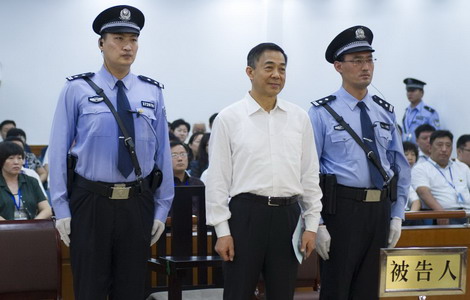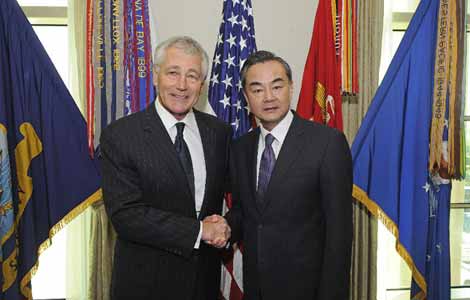A chance to renovate
Updated: 2013-09-22 14:31
By Deng Yaqing (bjreview.com)
|
||||||||
"China's biggest strength consists in its huge population and market," said Zhang. "Entrepreneurs should be encouraged to explore the new demands of consumers and create new growth points for the economy."
The question now is how to expand domestic consumption in a more moderate way. "From the perspective of both consumers and entrepreneurs, a sense of safety is a key issue," said Lin Yu, Co-CEO of NQ Mobile, a global Internet security service provider. For customers, only when basic public services are provided, such as education and health care, can they really release their consumption potential; for entrepreneurs, only when a problem like intellectual property rights infringement is tackled and a competitive but fair environment is established can Chinese entrepreneurs regain the enthusiasm to innovate and make long-term investments, Lin said.
|
 A sense of safety: Lin Yu (right), Co-CEO of NQ Mobile, presents a safety helmet to Zhang Weiying (left), an economics professor of Peking University, at the China's Consumer Nation session on September 12. [Photo / bjreview.com]
|
Interest rate reform
"The removal of the upper limit on deposit rates is the last vital step to completely set the banking sector free," said Li Minxian, President of Guangdong Development Bank, at the forum. In July, China removed its floor on lending rates, but experts say removing the ceiling on deposit rates is more vital for the country to realize full interest rate liberalization. Removing the ceiling is widely considered to be the more "risky" move, however.
Despite a promise to give full play to the role of the market, the Chinese Government has been very cautious in liberalizing interest rates. "Eliminating the ceiling on deposit rates too quickly may incur fierce competition among banks, with the result being that deposit rates would shoot up much faster than lending rates," said Hong Qi, President of China Minsheng Banking Corp. Therefore, the interest margin would substantially shrink, forcing banks to step into high-risk fields. If these banks fail in managing risks, bankruptcy would be inevitable.
To make sure the banking sector would face the challenge smoothly, a deposit insurance system, as seen in developed countries, is needed, said Hong. More specifically, an insurance institution needs to be set up to provide financial assistance and ensure depositors can get their money back when banks are caught in crisis or on the brink of bankruptcy.
Although interest rate liberalization is fraught with risks and dangers, both commercial banks and the government insist that it is an indispensable part of China's financial reform.
Less intervention
Premier Li also reiterated the need to transform government functions in order to create more efficiency and less bureaucracy.
In March, the Ministry of Railways was reshuffled to create the China Railway Corp., which took over its commercial operation. Before the reform was carried out, railway operation featured a combination of government functions and enterprise management. In other words, every link of the railway business was placed under control of the Ministry of Railways, which, at the same time, was entitled to deploy railway resources nationwide.
Now, the railway sector has been pushed toward marketization, with the China Railway Corp. shouldering its debts, marking the separation of government functions from enterprise operations in the sector.
Since the beginning of this year, the Chinese Government has lessened its involvement in provincial and municipal affairs and put more decision-making power exclusively in the hands of lower level governments.
Excessive government involvement from all levels has given birth to an array of problems such as repeated construction, mounting debts, and over dependence on the real estate market, Li Daokui, Director of the Center for China in the World Economy at Tsinghua University's School of Economics and Management, told Beijing Review. "Government involvement should be reduced in order to spur economic growth," he said.
Li Rongrong, former Chairman of the State-owned Assets Supervision and Administration Commission of the State Council, believes, "Only when the government stops interfering in the business sector, can enterprises realize independent management and restraint."

 In pictures: Nairobi mall shooting spree
In pictures: Nairobi mall shooting spree
 Bo Xilai gets life in prison
Bo Xilai gets life in prison
 Liaoning carrier completes its furthest sea trial
Liaoning carrier completes its furthest sea trial
 Milan Fashion Week
Milan Fashion Week Oktoberfest kicks off in Germany
Oktoberfest kicks off in Germany
 China, US applaud improvement of military ties
China, US applaud improvement of military ties
 Two family-style eateries are where animals roam
Two family-style eateries are where animals roam
 China braces for super typhoon Usagi
China braces for super typhoon Usagi
Most Viewed
Editor's Picks

|

|

|

|

|

|
Today's Top News
Bo Xilai gets life in prison
China braces for super typhoon Usagi
Explosive criminal cases drop in China
New Sino-US ties sought
Islamists claim gun attack in Nairobi
China sees drop in donations
Charges against Saudi princess in US dismissed
Trending news across China
US Weekly

|

|





